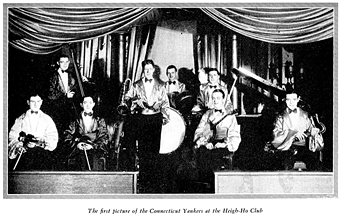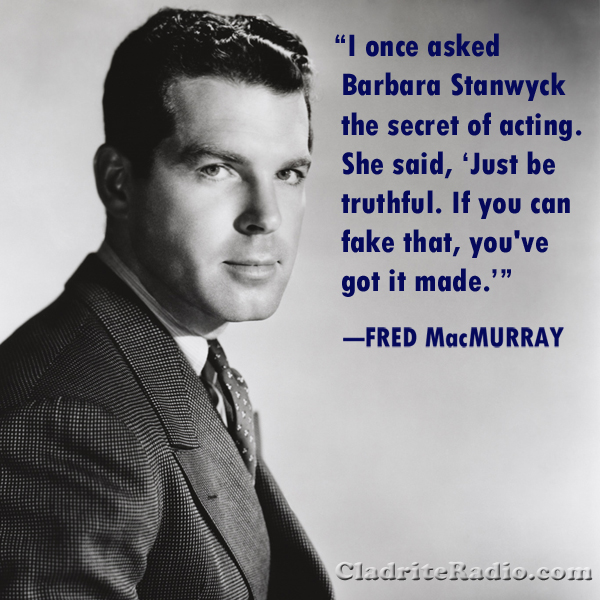Here are 10 things you should know about Fred MacMurray, born 115 years ago today. He was a more versatile performer and a much bigger star than many recall today.
Tag: George Olsen
Fred MacMurray, Man of Many Talents
Fred MacMurray is Turner Classic Movies‘ Star of the Month, and that suits us fine. A total of 32 movies will be shown on Wednesday nights in January, beginning at 8 p.m. ET.
We can’t think of another actor as underestimated as MacMurray. He is widely remembered today for the latter phase of his career—his Disney movies and his television work—but in the 1930s, ’40s and even into the ’50s, he exhibited a wider range than any My Three Sons fan might ever imagine.
After all, can you imagine Steve Douglas, widower and pipe-smoking, cardigan-wearing father of three boys, teaming up with Barbara Stanwyck in a blond wig to kill her husband for an insurance payout?
MacMurray pulled off just such a role in the classic film noir Double Indemnity (he starred opposite Ms. Stanwyck four times altogether, the lucky stiff, beginning with the oft-praised-in-this-space 1940 romantic dramady-slash-Christmas movie, Remember the Night).
Fred MacMurray also was adept at romantic and screwball comedies, appearing opposite Carole Lombard (with whom he also worked four times) in such pictures as Hands Across the Table and True Confession.
When you consider that MacMurray also played a mutinous Navy lieutenant in The Caine Mutiny (1954) and a lecherous advertising executive in The Apartment (released, ironically enough, the same year My Three Sons debuted), you start to get the picture.
To top it all off, MacMurray began his career as a saxophonist and singer with such outfits as the Gus Arnheim Orchestra and George Olsen and His Music. MacMurray also appeared on Broadway in Three’s A Crowd (1930–31). He even appeared in a good number of westerns!
So you see, respect must be paid to Mr. MacMurray, who passed in 1991 at age 83. He really could do it all and is well deserving of his Star of the Month designation.
Snapshot in Prose: Gordon & Revel
Though he would go on to work with other composers (and have his songs be nominated for the best original song Oscar nine times), Mack Gordon spent the 1930s paired with English pianist and composer Harry Revel. The duo were very successful indeed, penning a string of popular songs that included “Underneath the Harlem Moon,” “College Rhythm,” and our personal favorite Gordon-Revel tune, “Did You Ever See a Dream Walking?”
This Snapshot in Prose captures the pair in 1934, at the height of their shared success. Read to the end of the piece, and you’ll find some of our favorite renditions of a few Gordon-Revel compositions.


Fridays with Rudy: Vagabond Dreams Come True, pt. 1
Rudy Vallée only began performing on the radio in 1928, so the idea of penning a memoir in 1930, at the ripe old age of 29, might well be viewed as premature.
But modesty was never Vallée’s strong suit, so it’s perhaps not surprising that he was already itching to begin telling his story.
Here’s Chapter 1 from Vagabond Dreams Come True—enjoy!
THE SEVEN BOYS WHO WORK WITH ME
us, and their great love, we
would never have succeeded
 Thus springs up what is known as the Whiteman office, the Lopez office, the Bernie office, and this work to which they cater is called “outside” or “club” work. This work is sporadic, to be sure; that is, the work is seasonal, depending upon the seasons when debutantes come out, when marriages take place, when fraternal orders celebrate, when students are home for vacation, and when fraternities give their dances, during the football season. Thus, it is either feast or famine. However, most of the representative offices keep a certain number of men employed every week, and the advantage of club work is that sometimes three nights of hard club work pays more than seven nights of steady work. A club job is very hard while it lasts but it pays excellently, since the men usually play steadily from ten in the evening until the wee hours of the morning.
Thus springs up what is known as the Whiteman office, the Lopez office, the Bernie office, and this work to which they cater is called “outside” or “club” work. This work is sporadic, to be sure; that is, the work is seasonal, depending upon the seasons when debutantes come out, when marriages take place, when fraternal orders celebrate, when students are home for vacation, and when fraternities give their dances, during the football season. Thus, it is either feast or famine. However, most of the representative offices keep a certain number of men employed every week, and the advantage of club work is that sometimes three nights of hard club work pays more than seven nights of steady work. A club job is very hard while it lasts but it pays excellently, since the men usually play steadily from ten in the evening until the wee hours of the morning.

